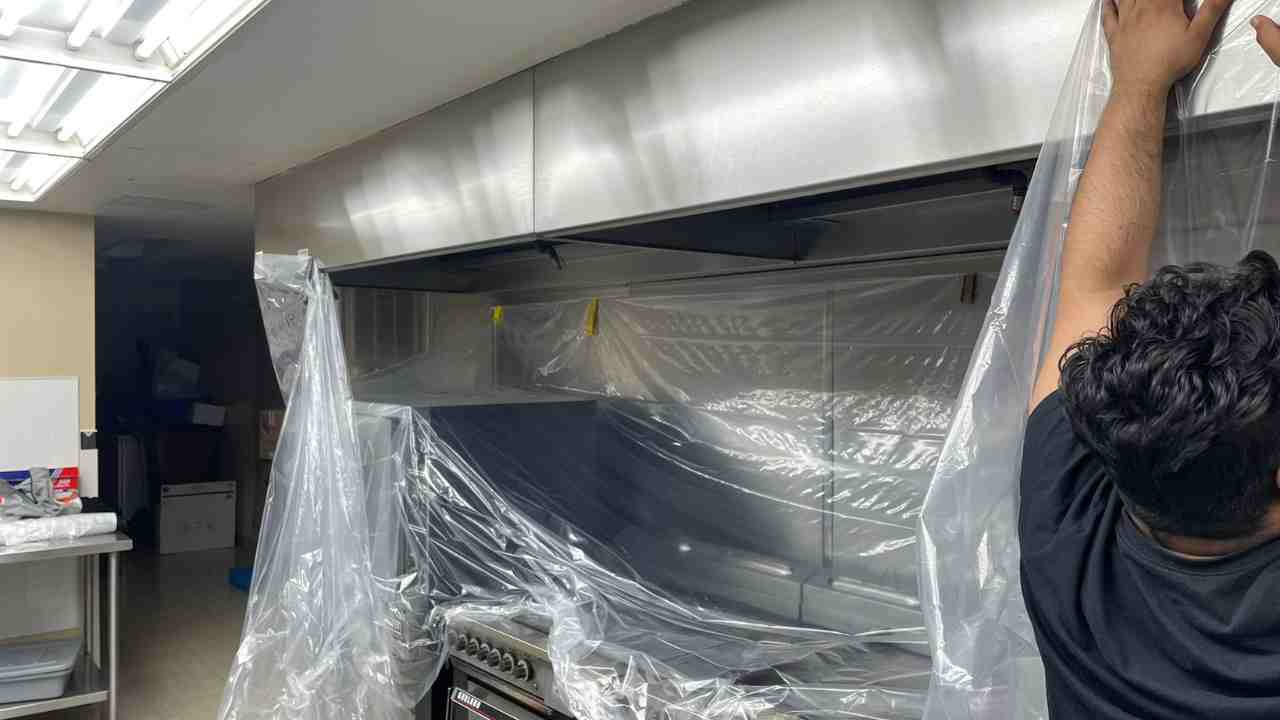How to Reduce Kitchen Exhaust Cleaning Costs

Ontario-wide Kitchen Exhaust and Hood Cleaning – Best prices and service guaranteed.
Keeping a kitchen clean and well-maintained is essential for any food service establishment. One crucial aspect of kitchen cleanliness is the regular cleaning of the kitchen exhaust system. However, the cost of kitchen exhaust cleaning can be a significant expense for businesses. In this article, we will explore various strategies and tips to help reduce kitchen exhaust cleaning costs without compromising on safety or cleanliness.
The Importance of Kitchen Exhaust Cleaning
Before diving into cost-saving measures, it is crucial to understand why kitchen exhaust cleaning is essential. The kitchen exhaust system plays a vital role in maintaining a safe and healthy environment in a commercial kitchen. It removes grease, smoke, and other airborne contaminants, preventing them from accumulating on surfaces and reducing the risk of fire hazards.
Regular cleaning of the kitchen exhaust system also helps maintain optimal airflow, ensuring that the kitchen ventilation system operates efficiently. This, in turn, improves indoor air quality, reduces odors, and enhances the overall comfort of the kitchen staff and customers.
The Factors Affecting Kitchen Exhaust Cleaning Costs
Several factors contribute to the cost of kitchen exhaust cleaning. Understanding these factors can help businesses identify areas where cost-saving measures can be implemented effectively.
1. Size and Complexity of the Kitchen Exhaust System
The size and complexity of the kitchen exhaust system directly impact the cost of cleaning. Larger systems with more ductwork, fans, and filters require more time and resources to clean thoroughly. Additionally, systems with intricate designs or hard-to-reach components may require specialized equipment or techniques, further increasing the cost.
2. Frequency of Cleaning
The frequency of kitchen exhaust cleaning is another significant factor affecting costs. The National Fire Protection Association (NFPA) provides guidelines for the recommended cleaning frequency based on the type of cooking and volume of grease produced. Adhering to these guidelines is crucial for maintaining safety and compliance. However, businesses should also consider their specific needs and adjust the cleaning frequency accordingly to avoid unnecessary expenses.
3. Level of Grease Accumulation
The level of grease accumulation in the kitchen exhaust system affects the time and effort required for cleaning. Regular maintenance and cleaning can help prevent excessive grease buildup, reducing the overall cleaning costs. However, neglecting regular cleaning can lead to a more significant accumulation of grease, requiring more extensive and expensive cleaning procedures.
4. Accessibility of the System
The accessibility of the kitchen exhaust system also impacts the cost of cleaning. Systems that are easily accessible and have well-designed access points can be cleaned more efficiently, reducing labor costs. On the other hand, systems with limited access or hard-to-reach components may require additional time and effort, increasing the overall cleaning expenses.
Strategies to Reduce Kitchen Exhaust Cleaning Costs
Now that we understand the factors influencing kitchen exhaust cleaning costs, let’s explore some effective strategies to help businesses reduce these expenses without compromising on safety or cleanliness.
1. Regular Maintenance and Cleaning
Implementing a proactive maintenance and cleaning schedule is crucial for reducing kitchen exhaust cleaning costs. Regularly inspecting the system, cleaning filters, and removing grease buildup can help prevent excessive accumulation and reduce the need for extensive cleaning procedures. Adhering to the NFPA guidelines for cleaning frequency is essential, but businesses can also consider their specific needs and adjust the schedule accordingly.
By investing in regular maintenance and cleaning, businesses can avoid costly repairs, improve system efficiency, and extend the lifespan of their kitchen exhaust system.
2. Train Staff on Best Practices
Properly trained staff can play a significant role in reducing kitchen exhaust cleaning costs. Educate your kitchen staff on best practices for minimizing grease buildup, such as scraping plates before washing, using appropriate cooking techniques, and regularly cleaning surfaces. By reducing the amount of grease entering the exhaust system, businesses can lower the frequency and intensity of cleaning required.
Additionally, training staff on how to identify signs of grease buildup or system malfunctions can help address issues promptly, preventing them from escalating into more significant problems that require costly repairs or extensive cleaning.
3. Invest in High-Quality Filters
Choosing high-quality filters for the kitchen exhaust system can help reduce cleaning costs in the long run. These filters are designed to capture a higher percentage of grease and airborne contaminants, preventing them from entering the ductwork and reducing the need for frequent cleaning. While high-quality filters may have a higher upfront cost, the savings in cleaning expenses and improved system efficiency make them a worthwhile investment.
4. Optimize Airflow and Ventilation
Properly optimizing airflow and ventilation in the kitchen can help reduce grease buildup and improve the efficiency of the kitchen exhaust system. Ensure that the exhaust hoods are correctly sized and positioned to capture the maximum amount of grease and smoke. Regularly inspect and clean the exhaust hood and ductwork to remove any obstructions that may hinder airflow.
Consider installing additional ventilation equipment, such as air curtains or UV-C light systems, to further enhance the effectiveness of the kitchen exhaust system. These technologies can help reduce grease accumulation and improve indoor air quality, ultimately reducing the frequency and intensity of cleaning required.
5. Partner with a Professional Cleaning Service
While it may seem counterintuitive to hire a professional cleaning service to reduce costs, partnering with a reputable and experienced company can actually help businesses save money in the long run. Professional cleaning services have the expertise, equipment, and knowledge to clean the kitchen exhaust system thoroughly, ensuring compliance with safety regulations and reducing the risk of fire hazards.
By outsourcing the cleaning to professionals, businesses can avoid the costs associated with purchasing specialized equipment, training staff, and allocating valuable time and resources to the cleaning process. Additionally, professional cleaning services often offer maintenance plans that include regular inspections and cleanings, helping businesses stay on top of their cleaning schedule and prevent excessive grease buildup.
Reducing kitchen exhaust cleaning costs is possible with the right strategies and practices in place. Regular maintenance and cleaning, staff training, investing in high-quality filters, optimizing airflow and ventilation, and partnering with a professional cleaning service are all effective ways to minimize expenses without compromising safety or cleanliness.
By implementing these cost-saving measures, businesses can not only reduce their cleaning expenses but also improve the efficiency and lifespan of their kitchen exhaust system. Prioritizing kitchen exhaust cleaning not only ensures compliance with safety regulations but also creates a healthier and more comfortable environment for kitchen staff and customers alike.
Read more about “Best Kitchen Exhaust Cleaning Services” right here.
Frequently asked questions about How to Reduce Kitchen Exhaust Cleaning Costs.

How can businesses effectively reduce kitchen exhaust cleaning costs without compromising safety and compliance?
Reducing kitchen exhaust cleaning costs is a strategic goal that can be achieved without compromising safety and compliance. One effective approach is to invest in a comprehensive maintenance program that emphasizes proactive and preventive measures. By conducting regular inspections and cleanings, businesses can identify and address grease buildup and potential issues before they escalate, avoiding costly emergency cleanings or repairs.
Additionally, partnering with reputable and experienced kitchen exhaust cleaning professionals can yield significant cost savings. These experts leverage their knowledge and expertise to optimize cleaning schedules and methods, ensuring thorough yet efficient cleanings. By tailoring services to the unique needs of each business, these professionals deliver cost-effective solutions that enhance the longevity of kitchen equipment and reduce the risk of fire hazards.
What are some practical strategies to optimize kitchen exhaust cleaning schedules for cost efficiency?
Optimizing kitchen exhaust cleaning schedules is essential for cost efficiency. Businesses can achieve this by carefully assessing their kitchen’s volume of cooking operations and the amount of grease generated. High-volume kitchens may require more frequent cleanings, while smaller establishments can benefit from less frequent cleanings without compromising safety.
Furthermore, integrating kitchen exhaust cleaning with other maintenance activities can yield cost savings. For instance, scheduling exhaust cleaning during planned downtime or seasonal closures can eliminate additional service charges and streamline overall cleaning costs.
By working closely with experienced kitchen exhaust cleaning professionals, businesses can develop a tailored cleaning schedule that maximizes efficiency while minimizing expenses, ultimately leading to substantial long-term cost reductions.
How can the implementation of advanced cleaning technologies contribute to cost-effective kitchen exhaust maintenance?
The implementation of advanced cleaning technologies can significantly contribute to cost-effective kitchen exhaust maintenance. New and innovative cleaning tools, such as high-pressure steam cleaners or hydro-jetting equipment, are highly efficient at removing grease and grime. These technologies enable quicker and more thorough cleanings, reducing the amount of labor required and consequently lowering cleaning costs.
Additionally, cutting-edge cleaning solutions can lead to improved cleaning outcomes, extending the time between cleanings. This reduces the frequency of service calls, resulting in long-term cost savings for businesses.
By embracing technological advancements and partnering with forward-thinking kitchen exhaust cleaning professionals, businesses can optimize their cleaning processes and experience substantial cost benefits while ensuring compliance with safety standards.
What role does staff training play in reducing kitchen exhaust cleaning costs?
Staff training plays a pivotal role in reducing kitchen exhaust cleaning costs and maintaining a cleaner and safer kitchen environment. Educating kitchen staff about proper cleaning practices and waste disposal can help minimize the buildup of grease and oil in the exhaust system.
Training staff to promptly report any issues or signs of grease accumulation allows for timely interventions, preventing potential fire hazards and costly emergency cleanings. By fostering a culture of cleanliness and responsibility, businesses can promote an environment where the entire team is committed to reducing kitchen exhaust cleaning costs through preventive measures.
Moreover, training kitchen staff to use equipment correctly and efficiently can minimize wear and tear on kitchen appliances, extending their lifespan and reducing maintenance expenses.
How does an emphasis on long-term cost savings justify the investment in professional kitchen exhaust cleaning services?
An emphasis on long-term cost savings justifies the investment in professional kitchen exhaust cleaning services. While some businesses may perceive professional cleaning as an initial expense, it is crucial to recognize the substantial savings it provides in the long run.
Partnering with experienced kitchen exhaust cleaning professionals ensures that cleanings are performed thoroughly and in accordance with safety regulations, reducing the risk of fire hazards and potential fines for non-compliance. Moreover, regular and proper cleanings enhance the efficiency of kitchen equipment, leading to lower energy consumption and reduced maintenance costs.
By preventing costly emergency cleanings and repairs, businesses can allocate their resources more efficiently and invest in growth initiatives. Ultimately, the investment in professional kitchen exhaust cleaning services aligns with a smart and strategic approach to cost management, fostering a cleaner, safer, and more profitable kitchen environment.
- hood cleaning
- How to Reduce Kitchen Exhaust Cleaning Costs
- kitchen exhaust cleaning
- restaurant hood cleaning







